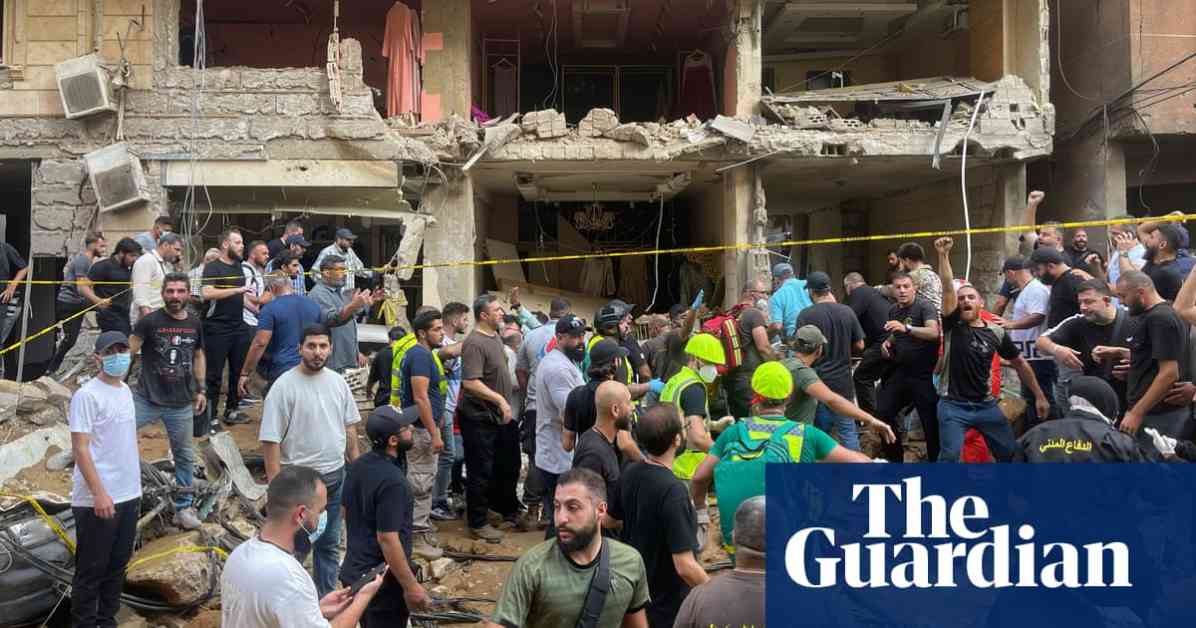UN Warns of Escalating Violence in the Region
The United Nations has issued a warning regarding the escalating violence between Israel and Iran’s allies, Hezbollah and Hamas. The recent Israeli airstrike in Beirut resulted in the death of at least 14 people, including a senior Hezbollah leader, Ibrahim Aqil. The strike also wounded 66 individuals, further exacerbating tensions in the region. The UN has cautioned that continued violence could potentially lead to a devastating regional conflict, urging all parties to exercise restraint and pursue diplomatic solutions.
The airstrike targeted Ibrahim Aqil, a prominent figure on Hezbollah’s top military council who was wanted by the US for his alleged involvement in the 1983 bombing of the US embassy in Beirut. Aqil, who led Hezbollah’s elite Radwan special forces, was killed along with 10 other senior commanders of the unit. Hezbollah confirmed Aqil’s death, describing him as one of its top leaders who had lived a life dedicated to jihad. The loss of such key figures on both sides has only heightened the tensions and raised concerns about the potential for further retaliation.
Israel’s Continued Attacks and Response from the International Community
Following the airstrike in Beirut, Israel’s Defence Minister, Yoav Gallant, made it clear that the attacks would persist until the residents of northern Israel could safely return to their homes. This declaration indicates Israel’s determination to continue its military operations against Hezbollah and Hamas, despite the escalating violence and growing civilian casualties.
The international community, including the United Nations and the United States, has called for a de-escalation of the conflict to prevent a full-blown regional war. UN political affairs chief Rosemary DiCarlo emphasized the urgent need for diplomacy and urged member states with influence over the parties to intervene and help defuse the situation. The US Deputy Ambassador to the UN, Robert Wood, reiterated that the US was not involved in the attacks and urged all parties to refrain from actions that could plunge the region into further turmoil.
Humanitarian Crisis and Healthcare Challenges in Lebanon
The recent wave of violence in Lebanon has not only resulted in loss of life and destruction but has also created a humanitarian crisis with significant healthcare challenges. The series of attacks, including the use of booby-trap devices disguised as pagers and walkie-talkies, has led to thousands of injuries and casualties, overwhelming the country’s healthcare system.
The healthcare sector in Lebanon, already strained by years of economic crisis and previous crises such as the Covid-19 pandemic and the Beirut port blast in 2020, is now facing unprecedented challenges. Hospitals are inundated with patients requiring urgent medical attention, with doctors and medical staff working tirelessly to treat the wounded. The long-term impact of the injuries sustained, including loss of limbs and sensory organs, will pose significant challenges for the affected individuals and the healthcare system as a whole.
The UN’s high commissioner for human rights, Volker Türk, has condemned the attacks as violations of international law and potential war crimes, particularly due to the deliberate targeting of civilians. The use of tactics aimed at spreading terror among the civilian population further exacerbates the humanitarian crisis and raises concerns about the protection of human rights in conflict zones.
In light of the escalating violence and deteriorating humanitarian situation, Lebanon’s health officials are grappling with the immense task of providing care and support to the injured and displaced populations. The resilience of the Lebanese healthcare system is being put to the test, as the country navigates through multiple crises simultaneously while trying to maintain essential services and support for those in need.
Amid the ongoing conflict, the international community, led by the UN and various governments, is working to provide assistance and support to Lebanon and its people. Efforts to evacuate foreign nationals from the country and provide humanitarian aid to those affected by the violence are underway, with a focus on mitigating the immediate impact of the conflict and addressing the long-term consequences of the crisis.
As Lebanon faces the challenges posed by the escalating conflict and the humanitarian crisis, the need for international solidarity and cooperation becomes more critical than ever. The protection of civilians, respect for human rights, and the pursuit of peace through diplomatic means are essential in addressing the root causes of the conflict and preventing further escalation of violence in the region.












